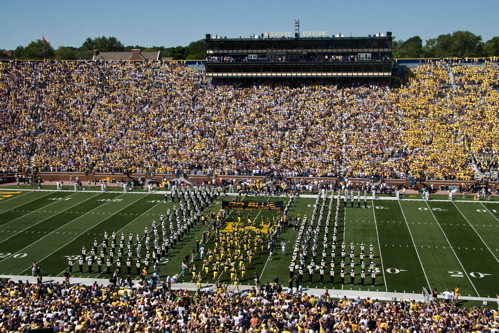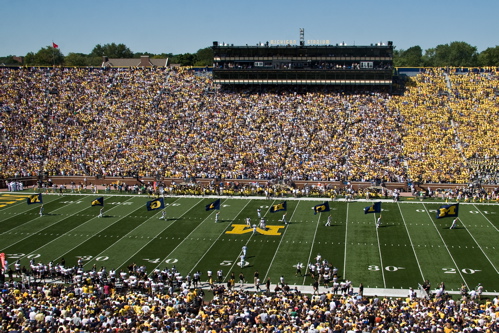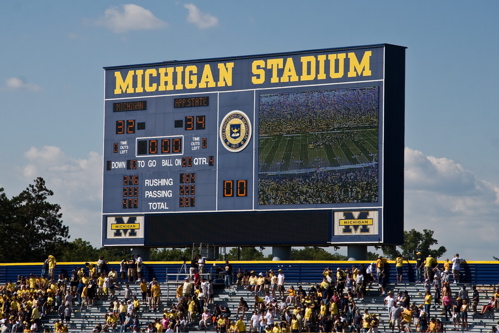On Saturday morning, I drove toward Ann Arbor with a sense of anticipation; the sun was shining, the sky was a beautiful blue, college football was beginning yet again, and I was going to Michigan’s opening game. It was a good day, and I, like most other Michigan fans, assumed it would end well, too.
On my walk to the stadium, I noticed that the general atmosphere seemed to be a bit subdued; it struck me as odd because even when the opening game isn’t a marquee matchup (which is, of course, nearly every year), the atmosphere is usually festive simply because football is back. But this time, gameday didn’t have that feel; compared to other opening games, the atmosphere felt almost bored. But it didn’t seem too relevant, and really, I was too excited to dwell on that thought.
As I stood outside the stadium gates engaging in some always-entertaining people-watching, I discovered that even Appalachian State fans seemed to assume the day would end well for Michigan. As he threw away the remains of his meal, one ASU fan jokingly told a few nearby Michigan fans that his NCAA-champion Mountaineers wouldn’t “run up the score too badly.” Everybody laughed, and I couldn’t help but smile as I headed toward the stadium.


Kickoff came and went, Michigan scored an early touchdown, and our assumption of casual victory began to look like it was coming true. But then ASU scored on a big play that made Michigan’s defense look like it had started the party a few hours too early, and the scoreboard didn’t look like we all thought it should. Michigan scored another touchdown, and we thought perhaps this was a sign of things to come; yet again, we were wrong. ASU marched down the field and tied the score again, and everyone who wasn’t euphorically black and gold was perplexed. Michigan wasn’t in control, and ASU wasn’t just collecting a six-figure payout and enjoying the scenery; Michigan was playing like their uniforms and meaningless #5 ranking guaranteed a win, and ASU was playing like they actually wanted to win. And two touchdowns later, they weren’t just playing like they wanted to win; they were playing like they would win.
Somewhere around halftime, my brother-in-law sent me a text message asking for the score. “28-17 ASU,” I responded. And since I thought he might not believe me, I continued: “I am not kidding.” His response echoed my own thoughts: “What the?!”
In the second half, Michigan finally seemed to be coming out of its coma; the defense did its job a few times, and the offense reciprocated, and suddenly ASU held a relatively paltry 31-26 lead. And then Mike Hart, playing with an intensity and desire that was clearly and beautifully evident even to those of us in the very last row, set the crowd on fire with a thrilling 54-yard touchdown that gave Michigan the lead for the first time since the first quarter. All of a sudden, despite the previously abundant misery, and despite the shockingly subpar play from the Wolverines, victory seemed more than possible; in the light of Hart’s obvious determination to win the game with or without his teammates, it seemed almost likely.
When the Michigan defense forced a late interception, victory seemed even closer. The offense managed to gain a first down or two, and we began to breathe a collective sigh of relief; the nightmare, it seemed, had been averted. The upset would have to wait. But we should have known better; we should have remembered the misery of the first half. The game was not over. Oh, the game was not over.
After those falsely-encouraging first downs, the offense started taking penalties. They were just irritating little minor penalties, like delay of game and false start, but they brought the offense to a halt; that brought the kicking unit onto the field to stretch the one-point lead to four. And that would have been wonderful, except the kicking unit managed to have the kick blocked, thereby causing thousands of Michigan fans to experience severe pain as they remembered the gaping void between Hayden Epstein’s departure and Garrett Rivas’ arrival. (Except the multi-headed kicking monster typically eschewed the excitement of blocked kicks, instead opting for the relative banality of wide left, wide right and way short.)
Prior to the kick of insufficient altitude, the defense had shown encouraging signs of understanding basic defensive concepts like “coverage” and “tackling”; this made the blocked kick seem less disastrous. But just as the offense had relapsed into its first-half self, so did the defense slip back into its nasty habit of attempting to trade land for peace, and it didn’t take long for ASU to make its way into position for a very, very short field goal. Naturally, because they were not having flashbacks to the Brabbs/Nienburg era, the field goal was good. But strangely, they had opted not to run down the clock before the kick, so there was a faint glimmer of hope.
That hope grew from a faint glimmer to what seemed to be a blinding searchlight when, on third and long, Chad Henne found Mario Manningham deep in ASU territory with six seconds left. We in the crowd had already traveled from despair to hope to joy and back to despair, and the unlikely completion that put Michigan in prime position to kick a game-winning field goal took us immediately from despair to elation. All that frustration could be offset by the victory that would be sealed by one kick.
Victory was indeed sealed by one kick, but it wasn’t Michigan’s kick; just like the previous attempt, that was blocked. Instead, the game-winning field goal belonged to ASU.

As I made my way back to my car, I found myself in the midst of not an angry crowd, but a purely stunned crowd. The moment the game was announced, nearly everyone marked it as a win; Oregon and Notre Dame were considered potentially dangerous non-conference games, but ASU was seen as the walkoverest of walkovers. So when Michigan ended up wearing the footprints, no one seemed to know how to react.
Of course, I knew the sports-watching public was already being inundated by the inevitable hysteria of ESPN and its ilk. No matter what else happened, ASU’s defeat of Michigan had to be the ad nauseam lead story everywhere; sports media adores events they can call historical, and without a doubt, they would adore the stuffing out of Michigan’s loss. Every halftime show, every Sportscenter, every local news sportscast would be talking about it.
But remarkably, when I got home, I found that the hysteria of the sports media was being overshadowed by a larger hysteria. The loss, along with the constant Biggest Upset Ever In The History Of Sports coverage, had driven many Michigan bloggers and commenters — particularly the latter — completely overboard. The shock of the loss had worn off, and the fan base was practically apoplectic. There was rage directed at every possible target of blame, starting with Lloyd Carr and ending anywhere and everywhere. Some fans swore off Michigan football, saying they would sell the rest of their tickets for this year; others even discussed burning the clothes they wore to the game. The Michigan fan base had taken the excessive Biggest Upset Ever concept to an entirely new level, where the loss to ASU suddenly became a horrifying tragedy that not only mangled the 2007 season beyond repair, but threatened to destroy over 100 years of Michigan football tradition.
As I watched the meltdown and the hyperbolic media coverage, I found the target of my irritation changing. At first, I was focused on the loss; however, the more hysterical the meltdown became and the more ESPN and its sheep branded it the biggest upset ever, the more I became irritated at the unnecessarily distraught fans and the media. What had started out as an upset had become a tragedy thanks to the unmitigated overreaction following the game.
The more I heard about the catastrophe of Michigan’s defeat, the more I became convinced that the upset was being significantly exaggerated; though ASU’s victory was an upset, there is a team on Michigan’s 2007 schedule that could pull a more significant upset: Eastern Michigan.
I know, I know; EMU is 1-A. But what does that prove? While EMU is a lowly 1-A team, ASU is the best team in Division 1-AA. That is not an insignificant accomplishment; it is not like saying they are the best Arena Football League team or the best minor league baseball team; it is not like saying they are the best JV football team. This is a highly-talented, well-coached team that is not just capable of playing very good football, but is fully capable of beating a number of 1-A football teams, including EMU. Contrary to the knee-jerk divisional arrogance now on display, football with an extra A isn’t automatically one step below 1-A football; in fact, the top end of 1-AA football would slot solidly in the middle of 1-A.
From that perspective, ASU’s victory is the Biggest Upset Ever not because the quality of football at the 1-AA level is uniformly inferior, but merely because of that extra A. Sports media gets to hype some sort of alleged biggest ever while fans get to express depression or jubilation because Michigan lost to a 1-AA team, but all the historical declaration and exaggerated emotions are based on an extra A and a lazy approach that treats all of 1-AA as a big JV division. Michigan lost to a 1-AA team, but that team is the equivalent of at least a decent MAC team, and the reaction to this loss has been far more hysterical than any reaction to a loss at the hands of one of those decent MAC teams.
This is in no way an effort to downplay ASU’s victory as an upset; it was an upset, and for Michigan, it was a bad loss that never should have happened. But it is not astoundingly historical in a truly meaningful sense, it is not disastrous or catastrophic, and it is not the end of Michigan’s season. Let me say it again: the loss is not the end of Michigan’s season. There are eleven more games to win, there is a conference title to win, and there will be a bowl game to win.
So, with the ASU game in the past, I have a request to make of my temporarily irrational fellow Michigan fans: stop being a part of the hysteria problem. Drop the suicidal overreactions and the absurd calls for a mid-season coaching change; start getting ready for next Saturday, and the ten Saturdays after that. The mourning period is over, but the season isn’t.
Go Blue.

Burrill Strong. I completely understand the lack of talent in my school’s (Eastern Michigan University) football team and I can understand that while people have voiced their opinions about their lackluster football season records….I am appalled that you of all wonderful people would dare put the Eastern Eagles into your blog in such a sad and helpless tone. People of various backgrounds DO in fact read your blog and because of this, I don’t think I can be your friend anymore. I truly believe that sticking by your football team through thick and thin is a very noble thing, and quite frankly, I have to stick by mine. We are now enemies for this football season, Mr. Strong. Enemies. I SAID GOOD DAY!
How was that?? It’s quite frankly the longest message I have ever left on your blog before. I am quite pleased with myself. Oh, by the by, I passed on Scrabble; it’s your turn.
Long live Boo and White Toast…who was a little more toasted on Saturday after that game…in more ways than one.
Concur. After a certain point, the hyperbole relieves them of any claim on credibility. How many times can Brent Muskburgler call a game “the game of the century”? How many times can USC have the greatest team in the history of football? At first, I thought Michigan really did suffer a horrible upset. But after the 13th article proclaiming that Michigan football might never recover from this, I’m starting to think it must not be that bad of an upset.
Retro clothing is the bomb! My favorite place to find it is Goodwill or any thrift store. Ebay is also a great place to find what you are looking for.
Hey, you used to write fantastic, but the last few posts have been kinda boring… I miss your tremendous writings. Past few posts are just a little bit out of track! come on!
Very nice info and right to the point. I don’t know if this is in fact the best place to ask but do you folks have any thoughts on where to employ some professional writers? Thanks in advance 🙂
It’s in reality a nice and useful piece of info. I am happy that you shared this helpful info with us. Please keep us informed like this. Thank you for sharing.
Traiteur Rabat Regal; Traiteur de ronome au Maroc
Traiteur Rabat Regal au Maroc
I simply wanted to say thanks once again. I am not sure the things that I might have followed in the absence of the entire information contributed by you concerning such a concern. It was actually an absolute terrifying difficulty in my opinion, nevertheless being able to see the skilled avenue you processed that forced me to leap over delight. I’m just grateful for the support and trust you really know what an amazing job you are always providing educating the rest by way of your webpage. Most likely you’ve never met all of us.
Denver Strippers, Bachelor Party Strippers \\ The Best Female Strippers For Hire in Denver, Colorado – MyDenverDiamonds.com or 303-961-4120. You can contact us 24 hours a day with any questions or to book a stripper for a upcoming event! Thanks!